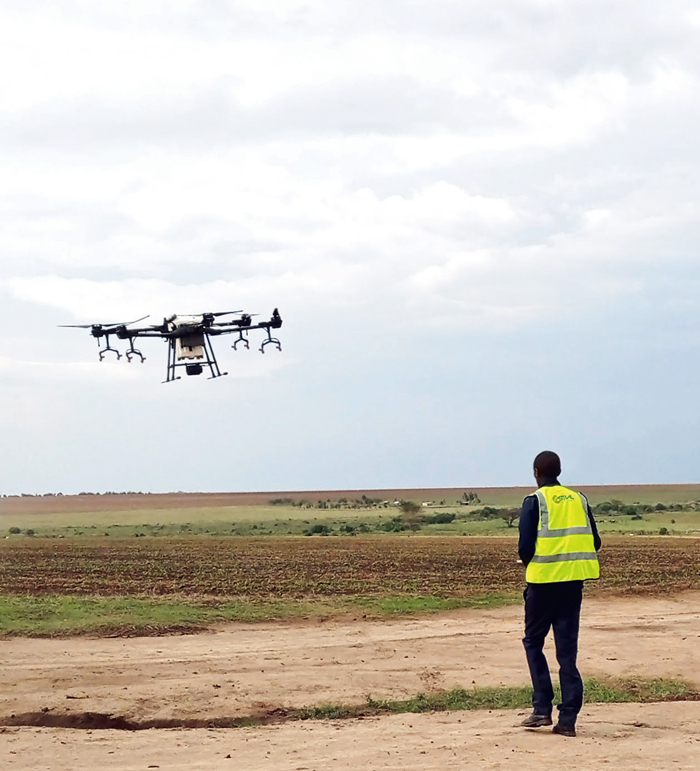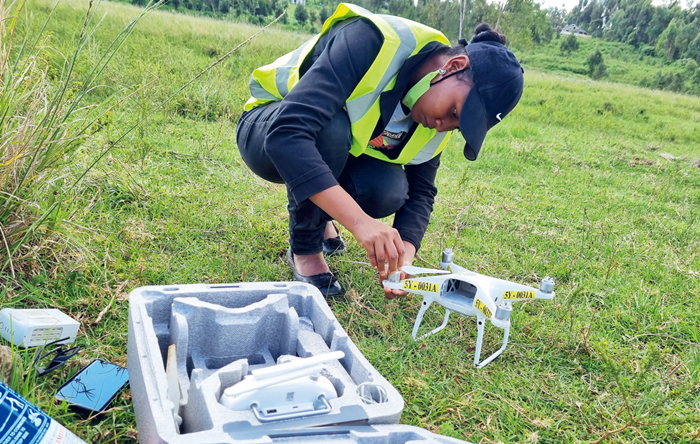|
||||||||||
| Home Nation World Business Opinion Lifestyle ChinAfrica Multimedia Columnists Documents Special Reports |
|
||||||||||
| Home Nation World Business Opinion Lifestyle ChinAfrica Multimedia Columnists Documents Special Reports |
| ChinAfrica |
| Up, Up and Away |
| Kenya’s drone sector ready to soar to great heights |
| By Faustine Ngila VOL. 13 DECEMBER 2021 ·2021-12-17 |

Nyambura’s instructor, Tony Mwangi, stands 10 meters away, keenly observing if his student had grasped the skills she had been trained on over the past two weeks. She checks the propellers, the control board and then places the drone on the periphery of five cones that form a square.
Nyambura confidently steps back five meters from the drone and take off, before hovering at a height of eight meters. From a radius of six meters, she performs several clockwise and anti-clockwise circular flights before flying it up to 50 meters in distance.
“I am learning to fly a crop spraying drone. Every day, I get closer to perfection,” she told ChinAfrica, before landing the drone gently.
Importance of licensing
Nyambura is one of only eight students who have now graduated from the Westlands-based start-up Drone Space, which commenced operations in April, aiming to impart the skills to as many Kenyans as possible.
Since receiving its Remote Operator Certificate (ReOC) from the Kenya Civil Aviation Authority (KCAA), Drone Space wasted no time in recruiting drone pilot trainees for services like videography, aerial deliveries and geo-mapping.
Capitalizing on free Application Programing Interface on Google Maps and artificial intelligence, Drone Space believes it could potentially revolutionize online deliveries in the country, giving existing delivery companies such as Glovo, Uber Eats, Jumia and Sendy stiff competition.
“This landmark certification is a critical step in the use of drones to provide solutions to everyday challenges,” said Mwangi, who is also Drone Space’s chief executive.
KCAA Director General Gilbert Kibe told ChinAfrica that the new sub-sector is expected to spur innovations across various sectors.
“Drone operations have birthed innovations that did not exist before. You can now get a license to do wedding photography, shoot a movie, deliver medicine and food, and assist with wildlife conservation, research and agriculture,” he said.
He added that the law requires individual drone operators to pay a license fee of Sh2,000 ($18) to KCAA and a similar amount for an importation fee. For commercial operators, a license is issued for Sh80,000 ($717) per year, renewable for Sh50,000 ($448) annually.
As one of the authorized unmanned aircraft systems training organizations in the country, the certification paves the way for Drone Space to fully realize the promise of unmanned aircraft systems technology to deliver innumerable economic and societal benefits.

Catherine Nyambura prepares a drone for flight at Drone Space's training zone at Sigona, Kiambu County, Kenya (FAUSTINE NGILA)
Helping farmers
At Nairobi’s innovation hub of Westlands, another commercial drone company Astral Aerial is helping farmers record higher yields.
The company has a dedicated spacious room for training commercial drone operators on everything from regular drones for aerial photography to large drones that can spray foliar fertilizer and pesticides on vast areas of crop plantations.
Since its clearance from KCAA, the company has traversed 16 counties in its mission to unlock agricultural potential in rural Kenya, while contributing to efforts toward achieving food security.
“We aim to reach every county in Kenya,” Kush Gadhia, Business Development Manager at Astral Aerial told ChinAfrica during a site visit.
The company has deployed big data to advise farmers in remote areas on better farming practices, helping them make quick decisions that guard against low crop yields and post-harvest losses.
According to Gadhia, the drones can help farmers take clear photos and videos of farms from above, which are then analyzed using geo-analytics software to determine crop health, soil acidity, and recommended pesticides and fertilizer, while predicting crop yields.
“In Murang’a County, we were able to deploy the technology to count thousands of avocado trees that would be tedious to do manually, while also detecting which ones had poor health,” said Astral Aerial’s head of operations Geoffrey Nyaga.
At a tea farm in Githunguri, drone images vividly indicate that crops at the middle of sections separated by paths used for spraying pesticides have yellow leaves and stunted growth.
This, according to Nyaga, shows that such crops are out of reach of manual spraying machines.
“This is where drone spraying comes in. Your foliar fertilizer or insecticide can reach every plant while also telling you which plants are weak,” said Gadhia.
He said Astral Aerial has trained farmers in Nzoia, sprayed pesticides on wheat farms in Narok, inspected farms in Machakos and Meru, counted livestock in Samburu and carried out mapping exercises in other counties.
“Farmers pay Sh700 ($6) per acre to get such services,” said Gadhia.
The company has in the past also been contracted to fight the desert locust menace that threatened to hamper efforts toward food security last year in Kenya, while also providing government with data on farm locations and helping the real estate sector collect data for stake holders.
The company conducts a two-week drone training program, where trainees pay Sh150,000 ($1,345) while Drone Space charges Sh160,000 ($1,430).
Once qualified drone operators can charge premium rates for their services, with current rates for aerial filming being $200 per hour, land mapping $1,500 per acre, and crop spraying $150 per acre.
Employment opportunities
Kibe said the growth of the sector demonstrates that Kenya is keen on aviation innovations. “Drone operations have created innovations that did not exist before,” he said. The Civil Aviation (Unmanned Aircraft Systems) Regulations, Act of 2019 was approved in April 2020, allowing Kenyans to buy and operate drones under the law.
“Over the last five years, there has been significant demand for potential drone pilots and legal operations,” said Mwangi, who expects the industry’s contribution to job creation to be significant.
In order to be issued with the ReOC license, companies must demonstrate that they are registered in Kenya and have adequate qualified staff.
Drone companies will also need a Ministry of Defense security clearance for matters related to defense in the Kenyan airspace, together with robust ground handling and maintenance arrangements.
According to the law, drone operations should never compromise national security, aid terrorism or crime activities, risk public safety or divert to unauthorized users.
Kenyans aged 18 years and above can own drones, but they are not allowed to transfer the ownership of drones without approval from KCAA. To date, the aviation regulator has issued 200 licenses to drone pilots.
KCAA has also approved nine commercial operations for drones in categories that include mapping, filming, media, surveillance and crop spraying.
Meanwhile, the Postal Corp. of Kenya (PCK) partnered with local drone cargo company Swift Lab Ltd. to roll out drone based last mile delivery services countrywide for medical supplies, e-commerce purchases and other cargo.
Under a three-year agreement, Swift Lab Ltd. will be manufacturing and operating drones that can travel up to 70 km and carry a payload of up to 4 kg.
Dan Kagwe, CEO of PCK, said the partnership would make the delivery of essential medical supplies in remote rural areas, and other goods, speedy and cost effective, through cutting out the middlemen. CA
(Reporting from Kenya)
Comments to zanjifang@chinafrica.cn
| About Us | Contact Us | Advertise with Us | Subscribe |
| Copyright Beijing Review All rights reserved 京ICP备08005356号-5 京公网安备110102005860号 |